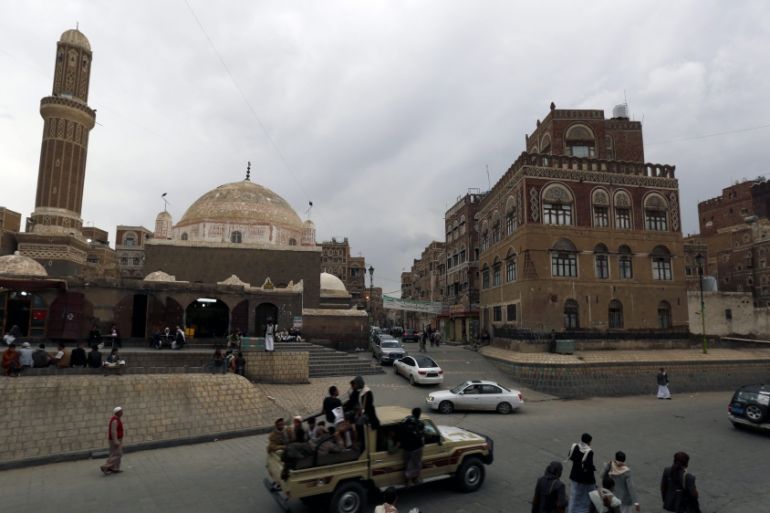Did Saudi Arabia and Iran hand al-Qaeda an advantage?
Al-Qaeda in the Arabian Peninsula could benefit from the Iranian and Saudi involvement in Yemen.

With Saudi Arabia and a loose coalition of Arab countries taking the fight to the Houthis in Yemen, and Iran, which denies backing the Houthi, warning of a regional spillover, there is one one group that is watching what happens next carefully.
Al-Qaeda in the Arabian Peninsula has long wanted Yemen’s Sunni and Shia Muslims to go to war. The group has long consolidated a foothold in Yemen and has been behind countless attacks and “terrorism” related plots.
AQAP officially came into existence in 2009 after complicated tribal rivalries between Yemeni tribes and Saudi fighters were quelled. They’ve had losses for sure, they’ve lost territory to both Houthi forces and to the Yemeni army when they took action in 2012. The central leadership is frequently targeted by US drone strikes.
But now this intense battle between Arab forces and the Houthis has given AQAP renewed hope that it can further its own goals, ones that include the destruction of the House of Saud in Saudi Arabia and Shia Islam.
We have seen this happen before. In Iraq, al-Qaeda didn’t exist before the US-led invasion and occupation. In Syria before the war al-Qaeda wasn’t an issue because they didn’t exist. In both countries they developed a presence. In Iraq, al-Qaeda morphed into ISIL, and in Syria al-Nusra Front took on the ideology of the group.
In both cases, intervention allowed thousands of fighters to cross into Iraq and Syria and join up with the group, swelling its numbers and becoming a significant fighting force. Without a shadow of a doubt, this latest conflict will attract hardline Sunni radicals to AQAP, and they will use the Arab Intervention as an excuse to go after Shia Houthi forces and grab territory.
Sunni anger
It’s unlikely that the Saudis, who have termed the air strikes “Operation Storm of Resolve”, have the appetite or capability for a ground war in Yemen. But no matter, because already a coalition of countries is willing. The Gulf states bar Oman are sending aircraft while Egypt, Jordan, Sudan and Pakistan have said they will offer troops for a ground offensive.
AQAP considers the rulers of these countries illegitimate and want to fight them in open war. Iran and the Houthis are seen as Shia “infidels” and are therefore also a target.
What you have in Yemen right now is the perfect set of conditions for a dangerous yet contained group like AQAP to suddenly grow larger and to funnel Sunni anger as they have in Iraq and Syria. No one is talking about AQAP, instead focusing on the Houthis. What few are looking at is the reason the Houthis took the actions that they have in deposing the government.
AQAP was part of that reason. AQAP and the Houthis have been engaged in a war against each other, and this has pushed the Houthis into deposing the government and demanding a larger say in government.
Complicated tribal alliances have meant that even tribes opposed to AQAP tribes have found themselves on its side when faced with the Houthis. This is one reason why Yemen is in the state that it is in today, and why an international but Arab-led coalition is bombing targets inside the country.
The US has authorised logistical and intelligence support and must be hoping that along with the Houthis being defeated and the old regime being restored, AQAP will also be defeated by the Arab forces. However, with Iran and the US engaged in a political deal over Iran’s nuclear programme all of the alliances in the Middle East are far from clearly marked.
Iran and Iraq, with the US are fighting ISIL in Iraq.
In Syria, Hezbollah and Iran are fighting to save Bashar al-Assad’s regime, while Jordan, the West, and the Gulf states with Saudi Arabia are fighting and arming various groups to dislodge it.
In Yemen things are even more convoluted. This is what AQAP and ISIL want. They want chaos. They want the old borders and the old regimes to fall, so that they can take over, and while both groups remain fringe movements in the larger Islamic world, they are pushing for chaos in the Middle East and they are seemingly succeeding.
It’s too soon, and too simple to say whether the actions of Iran and Saudi Arabia in Yemen have handed the country to al-Qaeda, but recent history suggests that AQAP will only benefit, certainly in the short term, with a bump in recruitment and push for further chaos in the region.
This is part of a weekly blog on security-related issues.